
Representation Theory
Scope & Guideline
Exploring the Depths of Algebraic and Geometric Structures
Introduction
Aims and Scopes
- Representation Theory of Algebraic Groups:
The journal emphasizes studies related to the representation theory of algebraic groups, including their characters, modules, and specific cases such as unipotent representations. - Categorification and Homological Algebra:
Many papers explore categorification processes and homological techniques in representation theory, providing deeper insights into the structure of representations. - Geometric Representation Theory:
Research often intersects with geometry, examining how geometric methods and structures influence representation theory, particularly in the context of algebraic varieties. - Quantum Groups and Their Representations:
The journal includes significant contributions on quantum groups, their representations, and associated algebraic structures, reflecting advancements in quantum algebra. - Local and Global Methods:
There is a strong focus on both local and global methods in representation theory, particularly concerning p-adic groups and the Langlands program. - Interconnections with Algebraic Geometry and Number Theory:
The journal also explores the links between representation theory and other areas such as algebraic geometry and number theory, indicating its interdisciplinary approach.
Trending and Emerging
- p-adic Representation Theory:
There has been a notable increase in publications focusing on p-adic representations, reflecting the growing interest in number theory and its applications to representation theory. - Geometric and Homological Techniques:
The use of geometric and homological methods has surged, indicating a trend towards integrating these perspectives into representation theory to solve complex problems. - Connections to Quantum Algebra:
Research on quantum groups and their representations is increasingly prevalent, highlighting a trend towards exploring quantum algebra's implications in representation theory. - Langlands Program and Its Extensions:
The exploration of the Langlands program and its extensions has gained momentum, emphasizing the journal's role in bridging representation theory with number theory and geometry. - Interdisciplinary Approaches:
There is a growing trend towards interdisciplinary studies that connect representation theory with other fields such as algebraic geometry, topology, and mathematical physics.
Declining or Waning
- Classical Representation Theory:
Topics related to classical representation theory, particularly for finite groups, have become less prominent, possibly due to a growing interest in more complex structures and modern approaches. - Simple Groups and Their Representations:
Research focusing specifically on the representations of simple groups has decreased, as scholars are increasingly exploring broader and more generalized frameworks. - Basic Theoretical Constructs:
Foundational theoretical constructs that were previously heavily discussed seem to be waning, with a shift towards more application-oriented or specialized studies. - Traditional Methods in Representation Theory:
Traditional methods, including straightforward character theory and basic module analysis, are being overshadowed by more sophisticated and innovative techniques.
Similar Journals
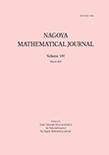
NAGOYA MATHEMATICAL JOURNAL
Advancing Mathematical Scholarship Since 1950NAGOA MATHEMATICAL JOURNAL, published by Cambridge University Press, is a prestigious journal that has been at the forefront of advancing mathematical scholarship since its inception in 1950. With an ISSN of 0027-7630 and an E-ISSN of 2152-6842, this journal has gained recognition for its high-quality research contributions in the field of mathematics, achieving a Q1 classification in Mathematics (miscellaneous) as of 2023. The journal’s impact is further reflected in its Scopus rank of #164 out of 399 in the General Mathematics category, positioning it within the 59th percentile of its peers. Scholars, researchers, and students can access a range of innovative mathematical studies that explore diverse topics, fostering a vibrant dialogue within the mathematical community. By catering to a global audience, the NAGOYA MATHEMATICAL JOURNAL continues to play a critical role in shaping contemporary mathematical discourse and research.
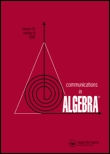
COMMUNICATIONS IN ALGEBRA
Innovating Algebra: Where Theory Meets Practice.COMMUNICATIONS IN ALGEBRA is a prestigious academic journal dedicated to advancing the field of algebra and number theory. Published by Taylor & Francis Inc, this influential journal has been in circulation since its inception in 1974 and continues to provide a platform for innovative research through 2024. With an ISSN of 0092-7872 and an E-ISSN of 1532-4125, it serves a global community of researchers, professionals, and students who are passionate about algebraic studies. The journal is currently ranked in the Q2 category in Algebra and Number Theory for 2023, showcasing its strong impact and relevance within the academic community, as reflected in its Scopus rank of #60 out of 119 and a 50th percentile standing. COMMUNICATIONS IN ALGEBRA aims to publish high-quality, peer-reviewed research articles that not only address current issues in the field but also pave the way for future exploration, solidifying its role as a cornerstone of mathematical literature.
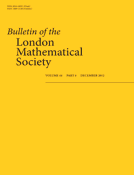
BULLETIN OF THE LONDON MATHEMATICAL SOCIETY
Pioneering Insights in Theoretical and Applied MathematicsThe BULLETIN OF THE LONDON MATHEMATICAL SOCIETY, published by Wiley, is a distinguished journal that serves as a vital resource in the field of mathematics. With its ISSN 0024-6093 and E-ISSN 1469-2120, this journal has consistently provided a platform for innovative research and scholarly discourse since its inception in 1969. Recognized for its quality, it currently holds an impressive Q1 ranking in the mathematics category, a testament to its significance in disseminating influential findings and trends in the mathematical sciences. Researchers and practitioners can rely on the BULLETIN for its comprehensive coverage of both theoretical and applied mathematics, which caters to a diverse audience ranging from professionals to students alike. Though it does not currently offer Open Access options, its articles can be accessed through institutional subscriptions, ensuring that significant works reach the academic community effectively. With contributions that span over five decades, the journal continues to shape mathematical research and inspire future advancements in the discipline.

JOURNAL OF ALGEBRAIC COMBINATORICS
Elevating research in algebraic theory and combinatorial innovation.JOURNAL OF ALGEBRAIC COMBINATORICS, published by SPRINGER, stands as a premier resource in the fields of algebra and combinatorics, playing a pivotal role in advancing research in these disciplines. With an esteemed impact factor reflective of its academic rigor, it holds a prestigious Q1 ranking in both Algebra and Number Theory, as well as in Discrete Mathematics and Combinatorics, according to 2023 assessments. Established in 1992, this journal features contributions from leading experts worldwide, offering insights into the latest developments and methodologies. Although not an open-access journal, it provides a wealth of valuable information and research findings focusing on combinatorial structures, theory, and applications that are essential for advancing academic inquiry. As a vital publication for researchers, professionals, and students alike, JOURNAL OF ALGEBRAIC COMBINATORICS continues to shape the conversation within the mathematical community and beyond, making it indispensable for those engaged in the dynamic landscape of mathematical sciences.

Journal of the Ramanujan Mathematical Society
Exploring the Legacy of Mathematical ExcellenceJournal of the Ramanujan Mathematical Society, published by the esteemed Ramanujan Mathematical Society, serves as a vital resource for researchers and professionals in the field of mathematics. With an ISSN of 0970-1249 and an E-ISSN of 2320-3110, this journal specializes in disseminating high-quality research and advancements in various domains of mathematics, particularly those that echo the legacy of the renowned mathematician Srinivasa Ramanujan. Since its inception in 2006, this journal has evolved to embrace a diverse range of mathematical topics, striving for excellence as evidenced by its current Q3 ranking in the mathematics (miscellaneous) category for 2023. Although it is not an open-access journal, the Journal of the Ramanujan Mathematical Society remains a cornerstone for those engaged in the academic study of mathematics, as it appears in Scopus with a rank of #343/399. As it continues its publication journey towards 2024, the journal aims to foster a vibrant community of scholars and practitioners who contribute to the evolving landscape of mathematical research.

Forum of Mathematics Sigma
Exploring the depths of mathematical excellence.Forum of Mathematics Sigma is a premier open access journal published by Cambridge University Press that has been at the forefront of mathematical research since its inception in 2013. With a strong emphasis on advancing the fields of mathematics, the journal consistently achieves Q1 rankings across multiple categories, including Algebra and Number Theory, Analysis, and Computational Mathematics. This distinction highlights its impact and relevance within the scholarly community. The journal prides itself on providing a platform for innovative research, fostering collaboration among researchers and practitioners across various mathematical disciplines. Open access publication ensures that cutting-edge findings are widely available to readers globally, enhancing the dissemination of knowledge. With an address in the heart of Cambridge, England, Forum of Mathematics Sigma is dedicated to promoting high-quality research and making significant contributions to the development of mathematics.
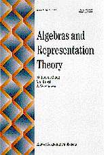
ALGEBRAS AND REPRESENTATION THEORY
Connecting Researchers in the World of AlgebraALGEBRAS AND REPRESENTATION THEORY, published by SPRINGER, is a premier journal that focuses on the cutting-edge developments in the field of algebra and representation theory. With an ISSN of 1386-923X and an E-ISSN of 1572-9079, this journal has fostered a robust platform for both established and emerging researchers since its inception in 1998. As a Q1 journal in the Mathematics miscellaneous category for 2023, it stands out for its rigorous peer-review process and commitment to academic excellence. Although it is not an open-access journal, its broad scope includes significant theoretical advancements and applications that resonate across various mathematical disciplines. Located at VAN GODEWIJCKSTRAAT 30, 3311 GZ DORDRECHT, NETHERLANDS, ALGEBRAS AND REPRESENTATION THEORY continues to contribute meaningfully to the scientific community by providing researchers with essential insights and fostering collaboration in the increasingly complex landscape of mathematics. Researchers, professionals, and students are encouraged to engage with the latest publications, as the journal plays a critical role in shaping contemporary discussions and innovations in the study of algebraic structures.

New York Journal of Mathematics
Empowering discovery through open-access mathematics.New York Journal of Mathematics is a prominent open-access journal, published by the ELECTRONIC JOURNALS PROJECT, dedicated to advancing the field of mathematics through the dissemination of groundbreaking research. Since its inception in 1996, the journal has evolved into a valuable resource for researchers, educators, and students, particularly in the realm of general mathematics. As of 2023, it proudly holds a Q2 classification in the Mathematics (miscellaneous) category, reflecting its growing impact and reach within the academic community, despite being ranked at the 31st percentile overall. With its commitment to open access since 2022, the journal ensures that high-quality mathematical research is readily available to a global audience, fostering collaboration and innovation. Researchers interested in contributing to this dynamic field will find the journal a vital platform for sharing their findings and engaging with fellow mathematicians around the world.
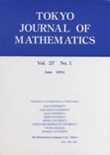
Tokyo Journal of Mathematics
Advancing Mathematical Frontiers Since 1978Tokyo Journal of Mathematics is a prestigious journal dedicated to the dissemination of high-quality research in the field of mathematics. Founded in 1978, this journal serves as a platform for researchers to publish their findings, providing cutting-edge insights into various mathematical theories and applications. Published by the TOKYO JOURNAL MATHEMATICS EDITORIAL OFFICE ACAD CENTER, the journal is based in Japan and forms an integral part of the global mathematical community. Although listed in the Q4 quartile of Mathematics (Miscellaneous) category for 2023, its inclusion in Scopus rankings highlights its ongoing commitment to scholarly excellence. The journal does not currently offer Open Access options, thus providing readers with insightful access to critical advancements in mathematics. With an ISSN of 0387-3870 and a publication history spanning over four decades, the Tokyo Journal of Mathematics remains an essential resource for researchers, professionals, and students alike, fostering the advancement of mathematical knowledge and collaboration across borders.
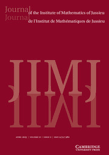
Journal of the Institute of Mathematics of Jussieu
Advancing Mathematical Frontiers with Every PublicationJournal of the Institute of Mathematics of Jussieu, published by Cambridge University Press, is a leading academic journal that has established itself as a vital resource in the field of mathematics. With an impressive impact factor and a ranking in the top quartile (Q1) of miscellaneous mathematics, the journal serves as a platform for high-quality research from both established scholars and emerging researchers. Spanning from 2002 to 2024, the journal aims to foster collaboration and innovation in the mathematical community by publishing original research articles, reviews, and critical discussions on a wide range of mathematical topics. Although the journal does not offer open access, it remains widely accessible through various academic institutions and libraries, ensuring that critical advancements in mathematics are shared with a global audience. Located in the United Kingdom at the prestigious Cambridge campus, the journal reflects the rigorous standards of its publisher and the rich academic tradition of its home institution.